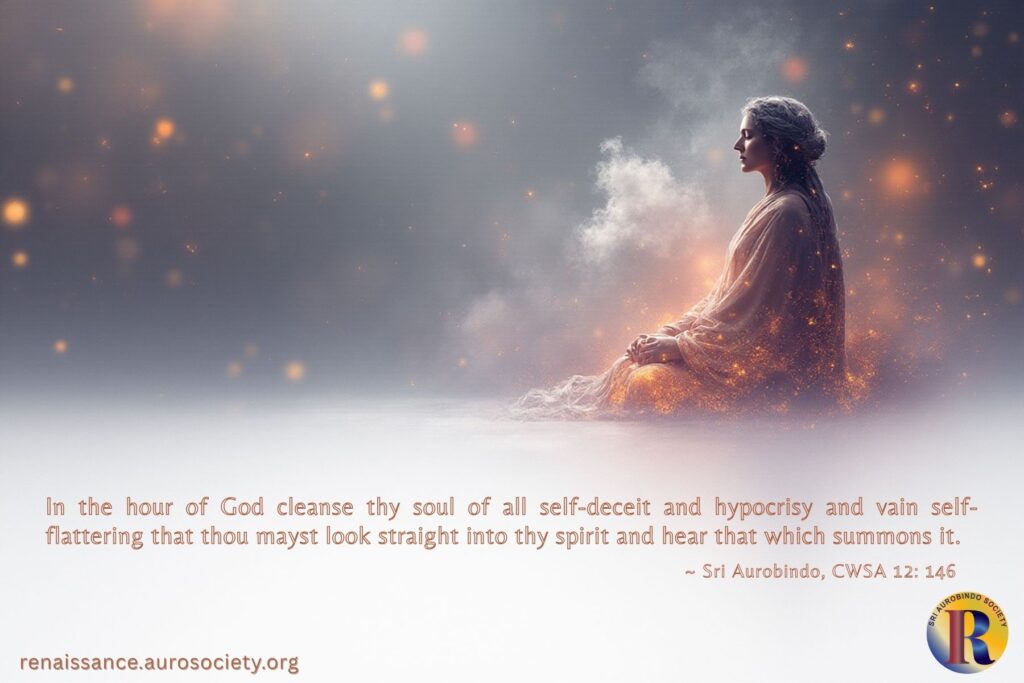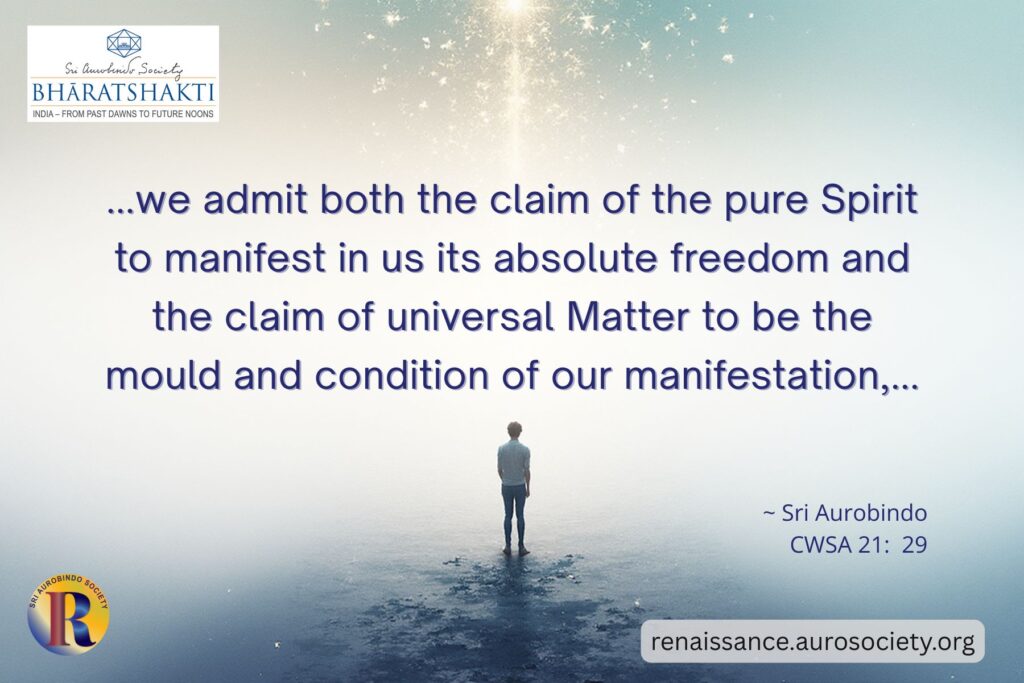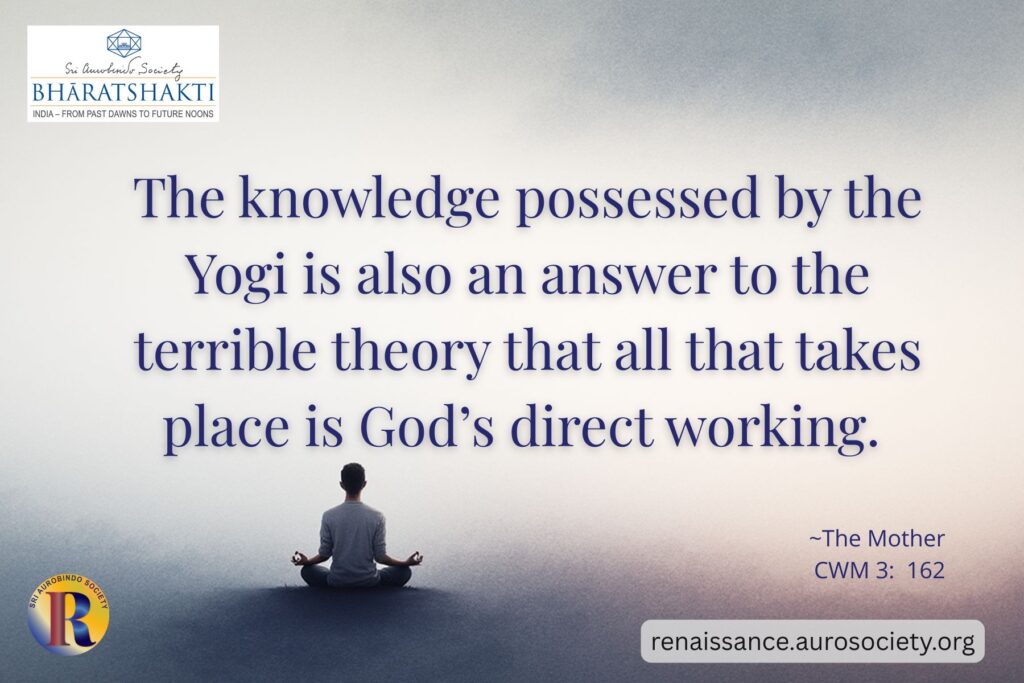Volume III, Issue 2
Author: A.L. Crampton Chalk
Continued from Part III
If any proof were needed of the immanence and validity of the law of sacrifice in our universe, we have only to look about us to see it demonstrated everywhere. The blows of fate, the slings and arrows of outrageous fortune that fall upon individuals, communities, nations, from every direction and, apparently, quite unconnected with any coherent moral causes, demonstrate the mechanics of it.
Survival of life in definitive forms necessitates a continual round of sacrifices of every degree of magnitude among and between the kingdoms and orders or creation.
Sacrifice as the Very Principle of Existence
A glance in any direction shows that life, consciousness, and matter are based upon, permeated with and supported by sacrifice as their very principle of existence. Humanity itself, as we must see, is impelled willy-nilly towards the fulfilment of its destiny by the operation of sacrifice. Cause and effect are its instruments and consciously or unconsciously humanity must accept this basic condition of life, and willingly or unwillingly follow it.
We may propound our little local moralities and ethical philosophies, systems, politics, and aspirations, but the mighty ritual of sacrifice rolls us and them and our worlds onwards and round about as if mounted on a machine, as the Gita says.
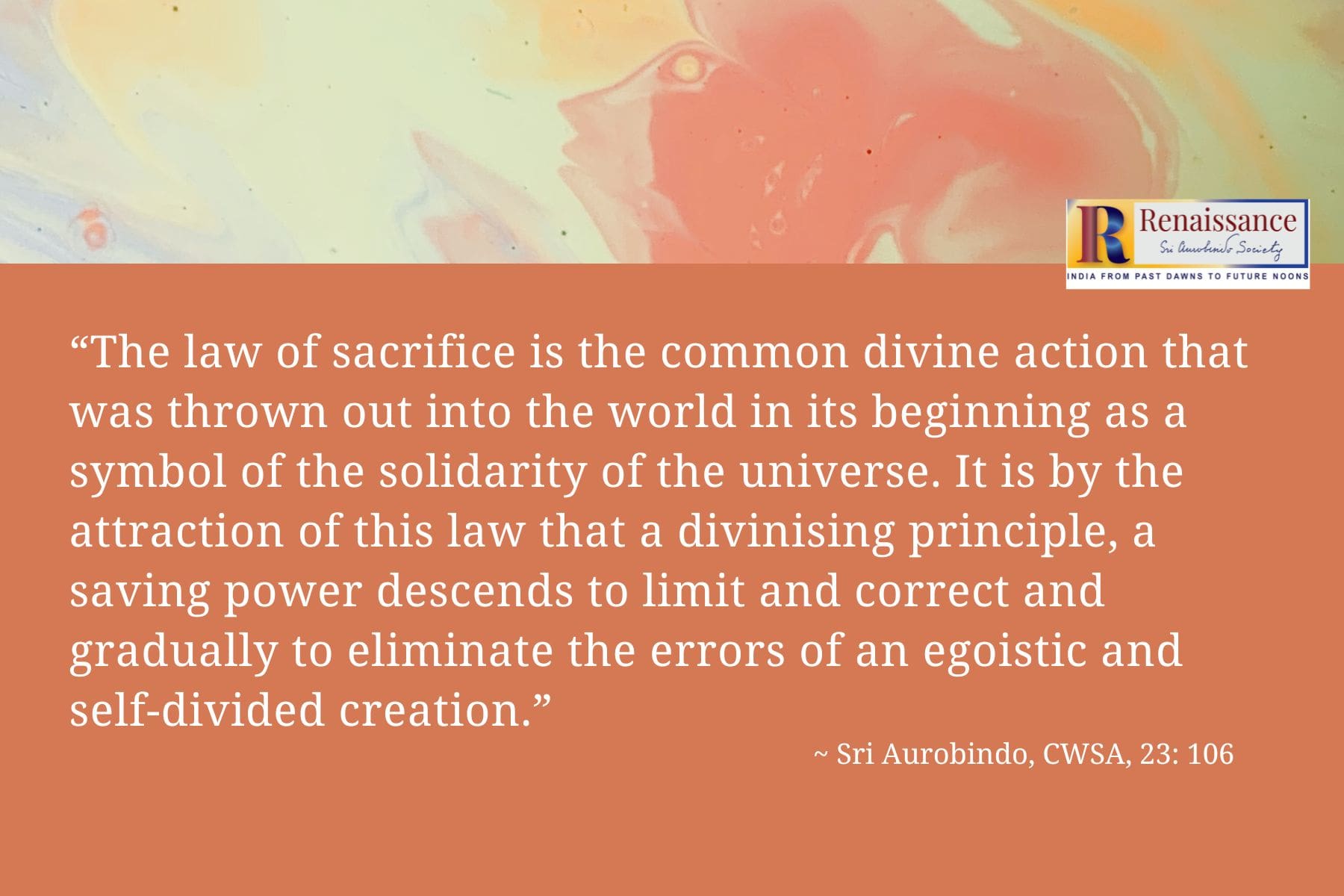
Thus, unswerving and unalterable, universal sacrifice makes thistle-down of our powers, and nonsense of our virtues and ethics, just as it makes figures of fun of those of our pundits who are forever striving to fit material and mental fragments together to find a self-sufficient and self-motivating pattern in what they take to be a material and mechanical universe.
Cohesive Power of the Spirit
The more political systems, economies, moralities, rules and regulations are enforced or attempted to be enforced without the cohering power of spiritual perception, the more dramatically does Nature in her own good time blow them away.
Without the cohesive power of the Spirit the fragmentary pieces of life simply cannot be combined and harmonised together; but when vitalised by the self-conscious Light of the Spirit they fly together and cannot be separated.
For the disciple still hedged around with his local pains and perplexities, still chained to an apparently invincible egoism, and always dragged about by a relentless and tyrannical mind, the hope is in prayer and meditation. He shall have already seen and accepted the validity and practical necessity for sacrificing his egoism, and by prayer and meditation he will strive to make his will effective.
But even with as much sincerity and aspiration as he can himself muster, he may still seem to be short of the power required for the longed-for breakthrough or experience of union with his spiritual being in the Divine. Something is lacking and he feels he wants help.
It is here that the mysterious power of the Grace of the Divine Shakti may come to his aid, if his faith and purity of purpose are sufficient to evoke it.
The normal introduction to the self-conscious acceptance of sacrifice – as apart from involuntary participation in the mechanical world-rite – seems to be through human love. In the generality of cases our self-offering will be to our fellow-creatures and those that are attached to us by natural and social ties.
Nature’s Way of Leading Us
The impulse and desire to protect and advance the interests of those who are extensions of our own individualities – near and dear to us, as the phrase goes – is nature’s way of leading us to the steps of the temple of self-dedication. If love is given its way in our lives, it will gradually become refined from its first gross egoism by the infiltration of the quality and effects of sacrifice, till it becomes unselfish and relatively pure.
Pure love is, of course, one of the prime movers of the universe, and even at human levels it is the single most powerful element for the acceptance, development, and fruition of the principle of sacrifice.
Even in a human context true love conquers all barriers, and when checked at one level will flow upwards to find its fulfilment at a higher one; derived from the spirit it has a sort of celestial power of gravitation that finds its level always higher, instead of always lower like water in the grip of material nature.
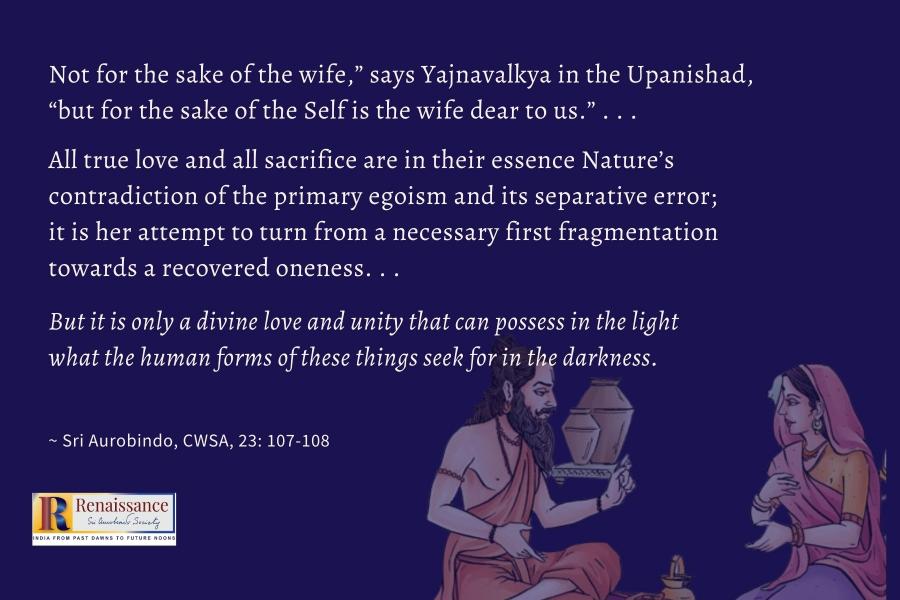
It is, indeed, this soaring power of love that bears up poor bedeviled humanity to face the tasks and circumstances under which it suffers and grinds, and gives it the will and force to accept and carry through the labours and sacrifices that are inevitable to it.
“Not for the sake of the wife,” says Yajnavalkya in the Upanishad, “but for the sake of the Self is the wife dear to us.” . . . All true love and all sacrifice are in their essence Nature’s contradiction of the primary egoism and its separative error; it is her attempt to turn from a necessary first fragmentation towards a recovered oneness. . . .But it is only a divine love and unity that can possess in the light what the human forms of these things seek for in the darkness.”
~ Sri Aurobindo, CWSA, Vol. 23, pp. 107-108
The Technique of Putting One’s Life and Affairs in the Hands of the Mother
When the sacrifice has gone far enough, no doubt, the postulant will have destroyed much of his own egoism, and the power of a superhuman love and devotion will begin to inform him. From then onwards he will come more and more under the direction of the Divine Mother and personal problems will begin to recede from him. He will, no doubt, increasingly live within the technique of putting his life and affairs in the hands of the Mother, for her to pass upon and decide and, above all, for her to take the responsibility.
The skill and effectiveness of his executive action will be increased as he becomes more and more conscious of the illimitable powers in control and support behind him. His participation in the divine ritual of the sacrifice will be lifted into the region of conscious identification with the Bliss and Oneness from which life and manifestation spring. Now he will be able to pray, in the words of the Mother –
“O Divine Master of love and purity, grant that in its least stages, its smallest activities, this instrument which wants to serve Thee worthily may be purified of all egoism, all error, all obscurity, so that nothing in it may impair, deform or stop Thy action.”
~ CWM, Vol, 1, p. 156
As this prayer is answered and the Grace comes to him, the postulant will find that this Yoga of sacrifice is all-sufficient for the conquest of egoism and the grand purposes of this life. He will find that it compels him to renounce all the inner supports of egoism, casting them out of his mind and will and actions, and to eliminate its seed, its presence, its influence out of his nature.
All must be done for the Divine; all must be directed towards the Divine. Nothing must be attempted for ourselves as a separate existence; nothing done for others, whether neighbours, friends, family, country or mankind or other creatures merely because they are connected with our personal life and thought and sentiment or because the ego takes a preferential interest in their welfare.
In this way of doing and seeing all works and all life become only a daily dynamic worship and service of the Divine in the unbounded temple of his own vast cosmic existence.
Life becomes more and more the sacrifice of the eternal in the individual constantly self-offered to the eternal Transcendence. It is offered in the wide sacrificial ground of the field of the eternal cosmic Spirit; and the Force too that offers it is the eternal Force, the omnipresent Mother.
Therefore is this way a way of union and communion by acts and by the spirit and knowledge in the act as complete and integral as any our Godward will can hope for or our soul’s strength execute.
~ Sri Aurobindo, CWSA, Vol. 23, pp. 113-114
Concluded.
READ PART 1, PART 2, PART 3
~ This essay was originally published in Sri Aurobindo Circle, 1952.

~ Design: Beloo Mehra, Bisawajita Mohapatra and Kavita Dutta

